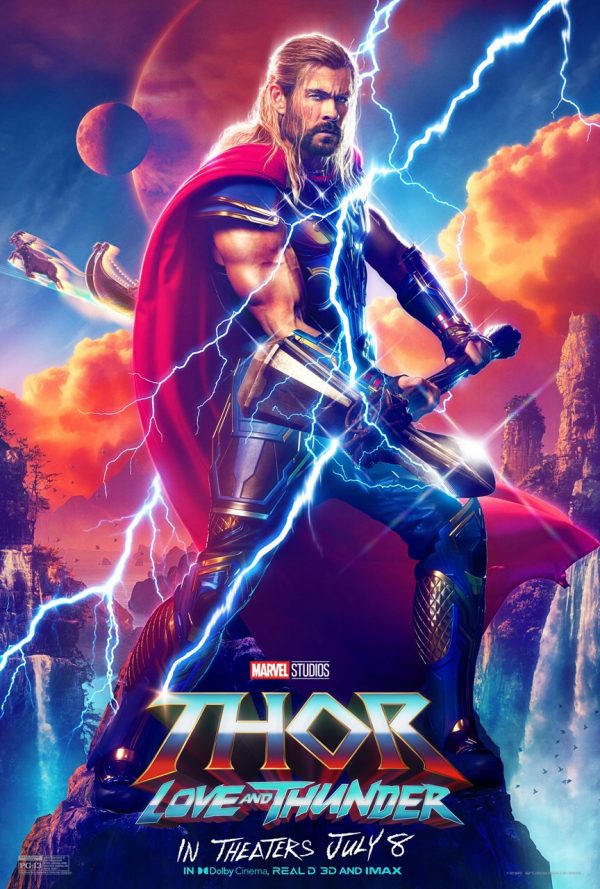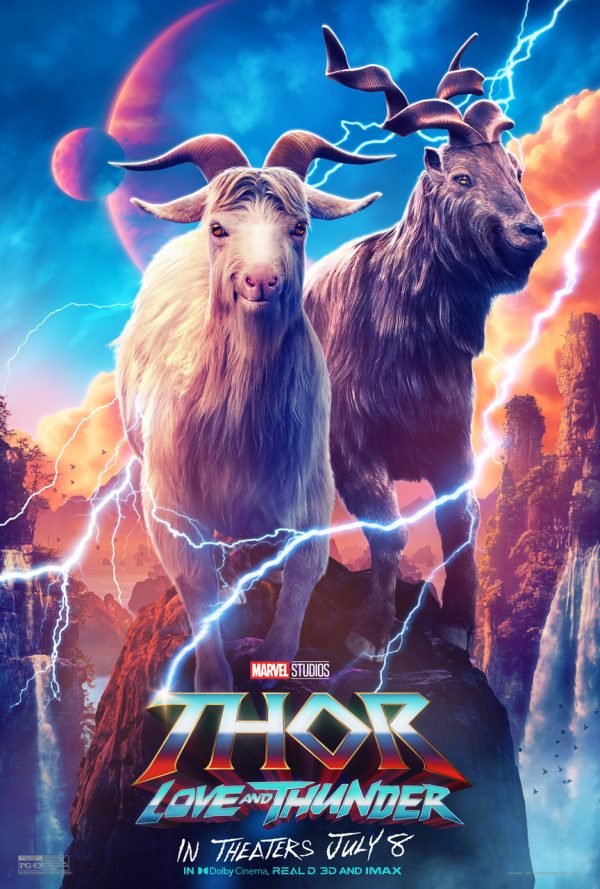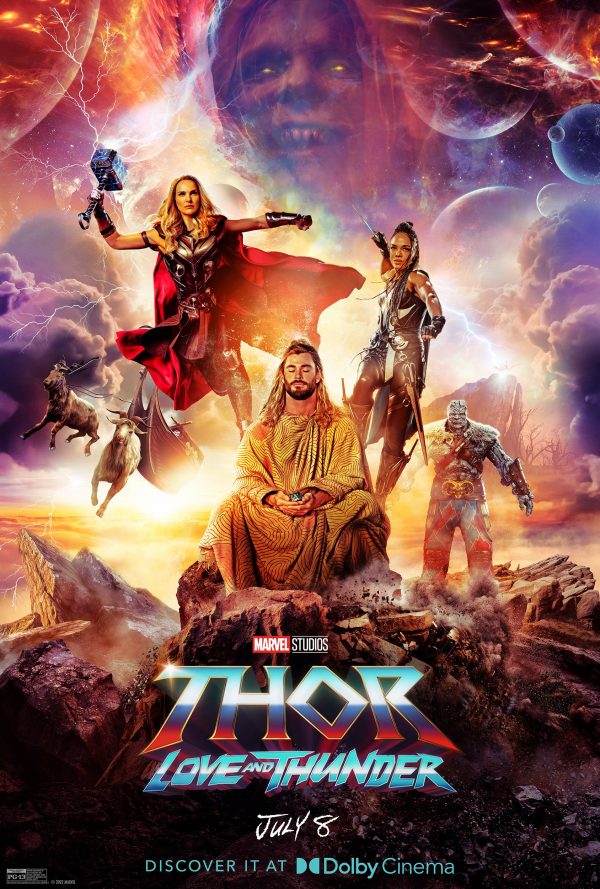
“Thor: Love and Thunder” (2022). Cast: Chris Hemsworth, Natalie Portman, Christian Bale, Tessa Thompson, Taika Waititi (voice), Russell Crowe, Chris Pratt, Bradley Cooper (voice), Vin Diesel (voice), Jaimie Alexander, David Bautista, Karen Gillan, Pom Klementieff, Sean Gunn, Kieron L. Dyer, Carly Rees, Ben Falcone, Stephen Curry, Idris Elba (uncredited), Matt Damon (uncredited), Luke Hemsworth (uncredited), Sam Neill (uncredited), Melissa McCarthy (uncredited), Brett Goldstein (uncredited). Director: Taika Waititi. Screenplay: Taika Waititi and Jennifer Kaytin Robinson. Story: Taika Waititi. Source Material: Stan Lee and Jason Aaron, Marvel Comics. Web site. Trailer.
Oftentimes in life we’re presented with turning points that put us in a position of having to make some crucial decisions, including those involving hard choices. They represent significant developments that will likely affect us for a long time to come in myriad profound ways. We may feel as though we’re out of our league in these instances, unable to proceed because the choices seem to be too big for us to make. Yet the power of choice in these matters rests with us, essentially making us the masters of our destinies. And, if we examine and embrace that capability sufficiently enough, we’re likely to discover that we can effectively chart our own paths, no matter how daunting they might seem, as a disillusioned god and pair of mortals learn for themselves in the surprisingly thoughtful new summertime blockbuster action-adventure, “Thor: Love and Thunder.”
After abandoning a directionless retirement in which he grew fat, lazy and despondent, Thor, the Norse God of Thunder (Chris Hemsworth), has toiled to shed his dad bod and regain his statuesque physique. He’s also resumed his mission to partake in heroic deeds, such as helping King Yakan of Indigarr (Stephen Curry) liberate his world from evil forces with the aid of his friends and fellow Avengers, the Guardians of the Galaxy, with whom he sought refuge in the early days of his retirement. And, for his valiant assistance, Yakan rewards Thor with a pair of enormous, powerful chariot goats, an unusual but impressive and valuable gift. However, to get back the personal autonomy he needs to be truly independent once again, Thor amicably parts ways with his Avenger colleagues and returns home to New Asgard, the settlement he and his followers established after the destruction of their ancestral home.
As Thor has worked to get his life back on track, his onetime romantic interest, astronomer Dr. Jane Foster (Natalie Portman), has done the same. In the eight years since they broke up, Jane has made a name for herself as a scientist and author. However, in more recent times, she has, sadly, been diagnosed with Stage IV cancer, and her conventional treatment regimen hasn’t been working. With her days dwindling and nothing to lose, she decides to pursue an alternative therapy – tapping into the power of Thor’s magic hammer, Mjolnir, which is said to possess tremendous healing capabilities. And so, with that objective in mind, she heads to New Asgard to find Mjolnir to see what she might be able to make it.
Meanwhile, as Thor and Jane pursue their respective agendas, a troubling new development arises that threatens the entire pantheon of the gods. When Gorr (Christian Bale), a devout, contrite follower of the gods, tragically loses his beloved young daughter to a fatal illness, he’s consumed by sorrow. And, when he stumbles into a chance encounter with the deities to whom he once so diligently prayed for his child’s recovery, he learns of their self-centered indifference toward the supplications of mortals, including those he so sincerely made. He becomes enraged and, when he unexpectedly acquires the ability to do in those who betrayed and mocked him, he vows to brutally and indiscriminately slay all of the gods in the Universe. This thus poses a tremendous threat to gods of all stripes – Thor included.

In waging his war against the gods, Gorr eventually makes his way to New Asgard, where he attacks the settlement, a way of getting Thor’s attention. But, in the midst of this battle, an unexpected development occurs – the sudden appearance of a substantially rejuvenated Jane, who has assumed the name Mighty Thor and has successfully learned how to wield the power of Mjolnir. Needless to say, Thor is stunned at the reappearance of his former love interest. Yet, as glad as he is to see her, it distracts him enough for Gorr to kidnap all of New Asgard’s children. Thor and Jane are now confronted with the dual challenges of retrieving the kids and keeping themselves alive in the face of Gorr’s determined plans to do them in – along with all of their divine peers.
Undeterred, Thor and Jane begin making plans to rescue the children and stop Gorr. They learn that he is on the verge of gaining access to a powerful force on a distant planet that could readily enable him to carry out his threats, presenting Thor and Jane with a daunting task. They believe they need help to combat the god slayer, so they decide to seek assistance from the pantheon of deities, a divine sanctuary housed on a world en route to Gorr’s stronghold. And so, with their plan set, Thor, Jane, Mjolnir, the chariot goats, and their colleagues King Valkyrie (Tessa Thompson) and Korg (Taika Waititi) begin their heroic journey.
Their stop at the pantheon proves disappointing, however. To their dismay, they find that the gods who reside there, under the rule of Zeus (Russell Crowe), king of the deities, are just as self-centered as those Gorr encountered after the death of his daughter. Zeus and his cohorts offer no assistance and even challenge the powers of Thor and his colleagues, forcing a heated confrontation and hasty retreat. But Thor’s skirmish is not without its rewards, as he makes off with the powerful lightning bolt that Zeus uses as a weapon against his enemies. It’s an acquisition that could prove helpful in Thor’s impending encounter with Gorr.
Upon resuming their journey, Thor, Jane and company embark on a quietly anguishing voyage. They’re uncertain they have enough firepower to carry out all of the aspects of their mission. But, on top of that, there are other issues hanging over them, such as the uneasy, unresolved romantic feelings between Thor and Jane, conflicting signals over who actually controls Mjolnir, and Jane’s wavering health status, a definite source of distraction for Thor. Will they succeed in their quest and resolve all of their other outstanding questions? Whatever the outcome, the results are sure to be epic, heartfelt, and, above all, surprising.
The odyssey that Thor and Jane experience is one that we all undergo at some point in our lives. They’ve each reached significant turning points, and they’ve come through them having to decide where they want to go next. Such decisions may not come easily, either, given that we may not be ready to give up what we already have for an uncertain future. In other instances, we may be ready to move on, but we’re not sure to what, given the myriad choices we have. And, in yet other cases, the potential changes could be so large and significant that we might not feel ready for them, perhaps even afraid of the consequences.

So what are we to do in these situations? That’s when we need to look to our beliefs, for they characterize what we think and feel and what’s about to unfold, an outcome of the conscious creation process, the philosophy that maintains we draw upon these powerful intangible resources in manifesting the reality we experience. Being presented with such free rein over our choices represents a tremendous opportunity, for our beliefs can conceivably make virtually anything possible. However, we must be careful in how and what we choose, because the beliefs we select will be faithfully reflected back to us through what we experience.
In the case of Thor and Jane, their reunion represents an opportunity for repairing their relationship and moving forward into the future together. At the same time, though, given that they’ve been apart for some time and have started down different paths, that option may not be feasible, and this act of coming together once more could instead be an opportunity to achieve closure with one another, a chance to resolve issues that were left unaddressed and unfulfilled. Which will they choose? That remains to be seen, but both possibilities are attainable, along with a host of other hybrid alternatives that incorporate elements of both scenarios, depending on the specific beliefs they each hold individually and collectively.
The same could be said here for Gorr. He’s been devastated by the loss of his daughter, but that development also represents a potentially significant turning point in his life. In his case, that has to do with his understanding of his personal power and with his relationship with the divine. For years, he believed the gods determined his fate, but now he’s come to realize that it’s in his own hands, that he, too, can operate with the power of a god. But what will he do with it, and how will that impact his relationship with those he once so devoutly worshipped? Will he use this newfound ability for the betterment of his circumstances (and possibly those of the world at large), or will he employ it in acts of petty retribution? Again, it comes down to his beliefs and what he chooses to do with them. But, before acting, he should take a close look at his options, given that some things won’t change – like bringing back the child he lost – no matter which path he selects. Does he want to commit himself to a future of unrelenting bitterness that fundamentally won’t change anything, or would it be preferable to pursue something more meaningful, perhaps a course that reflects the feelings he held for his daughter and that he can now share with others?
Obviously there are some significant choices to be made here, and they may represent hard ones. But such is what comes from life, and judiciously exercising our power in making them is a big part of what makes us human – or, apparently, gods – which, in its own right, might be one and the same, even if we’re only functioning at the apprentice level. When we consider what it takes to stridently engage in such a practice, it shows us just what heroes we innately are, and we shouldn’t be scared in making use of an ability that is inherently part of our own birthright. This film helps us to see that, and we should follow its guidance if we hope to make the most out of this experience we call existence.

These are not the kinds of questions one typically expects a movie like this to address, which is what helps to set “Love and Thunder” apart from many other superhero offerings, particularly those that come out of the Marvel Universe. Indeed, in an age when many of the films in this genre are becoming predictable and cookie-cutter in nature, it’s refreshing to see one of its franchises pulling away from the pack and distinguishing itself as something fresh and different. Following up on its charming breakout predecessor, “Thor: Ragnarok” (2017), this latest installment in this series further defines and delineates the franchise’s character, presenting a work that’s thoughtful and touching, but it does so with an approach that’s whimsical, funny and often delightfully silly without being stupid. Much of the credit for that goes to writer-director Taika Waititi, who has successfully crafted an identity for this series that’s distinctively all its own, one that incorporates elements different from its cinematic cousins, doesn’t rely exclusively on action sequences to be entertaining, isn’t needlessly overlong and doesn’t take itself so damned seriously.
“Love and Thunder” truly establishes Thor as both the lovable goofball and bona fide rock star of the superhero universe, setting the God of Thunder apart from his many stoic, bland, uber-noble counterparts. The picture’s impressive all-star cast (including an array of hilarious uncredited cameo appearances) provides an excellent vehicle for actors to show off comedic talents that they don’t often display in other works. And the primary rom-com storyline will pull at the heartstrings while simultaneously providing more than its fair share of laughs. Several sequences stretch on a tad too long, but there are so few of them that it’s hard to notice. While this may not be the “Thor” or Marvel movie that many hard-core diehard fans are expecting, that doesn’t matter. Like the “Deadpool” movies, it serves up something that breaks the tedium of a genre that has been growing progressively stale and tiresome, and any film that does that is certainly OK in my book. This is without a doubt the class of the summertime action-adventure theatrical releases to come out thus far.
Some may look on the prospect of becoming our own gods as overly audacious, perhaps even sacrilegious or heretical. However, if we truly are the masters of our own destinies, doesn’t it stand to reason that, if we’re to rise up to that challenge, we must take charge of the direction our lives will go? And isn’t that what an empowered god would do? Why should it be fundamentally any different for us, especially since, as so many spiritual traditions maintain, we’re made in the image of our gods? That being the case, we should start acting like them and not cowering in fear of our own personal power. Of course, we must be prudent in our exercise of these abilities, as the disappointing self-serving examples set by Zeus and his pantheon of cohorts so demonstrably illustrate. It may indeed be acceptable to make use of a little thunder at times when it’s warranted, as long as we temper our beliefs and actions with a whole lotta love, examples that Thor and Jane so aptly demonstrate. After all, what better kinds of gods could we possibly ask to be?
Copyright © 2022, by Brent Marchant. All rights reserved.

No comments:
Post a Comment